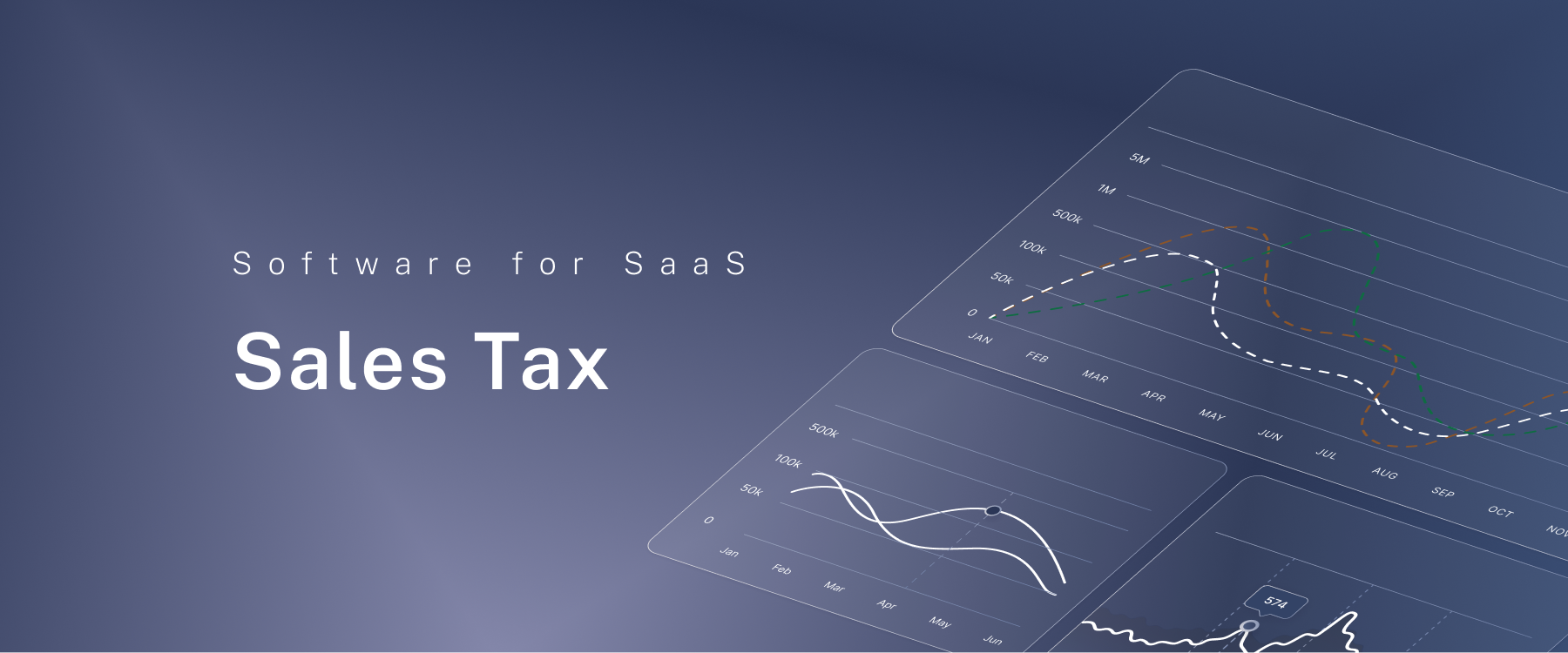.png)
Avalara may be a legacy name in tax compliance, but many businesses are rethinking their relationship with the platform.
From a major outage on Cyber Monday to confusing pricing, limited global coverage, clunky onboarding, and ongoing support issues—frustrated customers are looking for smarter, more transparent alternatives.
This guide explores what to consider when making the switch.
Why Businesses Are Switching From Avalara
What Avalara Offers
Avalara is the legacy offering in the sales tax compliance space. Its flagship product, AvaTax, promises a comprehensive solution for fast and efficient sales and use tax calculations for businesses. Founded in 2004, it still operates on dated technology and only provides partial automation. However, as a long-established sales tax solution, it is still used by many established businesses.
Common Avalara Complaints
Despite Avalara's established market position, the company has faced significant challenges in recent years. Their reputation suffered a serious blow when a system-wide outage during Cyber Monday left e-commerce customers unable to process sales during one of the year's biggest shopping events. Additionally, after a relatively brief period as a publicly traded company on the New York Stock Exchange, Avalara was acquired by private equity firm Vista Equity Partners in 2022, ending its public market journey.
Further Avalara customer complaints include:
- Confusing pricing structure – Complaints state that upfront monthly or annual fees tend to come with per-transaction fees, hidden costs and overages, and early termination fees for onerous long-term contracts.
- Limited global coverage – As a US-based solution, customers have complained that Avalara’s purported global coverage for VAT, GST and other types of taxes is actually limited, with the company contracting with local tax advisors rather than offering native solutions.
- Incomplete automation – Customers complain that they still spend hours per month on manual sales tax compliance, including tax return management and filing, despite being promised a one-and-done solution. Others complain that integrations with their preferred billing systems, online carts, marketplaces, and ERPs are limited.
- Poor onboarding experience – Customers complain that onboarding is a slow process requiring multiple meetings and often manual work from the customer’s technical teams in order to onboard with the service.
- Customer support issues – Customers who have onboarded complain about slow support response times, a lack of dedicated account managers after onboarding, and difficulty in reaching representatives after onboarding.
These recurring complaints highlight why many businesses are actively seeking modern, transparent alternatives that deliver on the promise of truly automated global tax compliance.
Best Avalara Alternatives to Consider in 2025
We listed out the current sales tax management software and solutions on the market, looking at categories like pricing transparency, automation, customer support, global coverage, and industry fit. (And, admittedly, we’re a little biased.) Which solution is right for your business?
Sphere (Best Overall Alternative)
.png)
Sphere stands out in a crowded field as a purpose-built tax compliance solution designed specifically for SaaS companies and global-first businesses. Unlike legacy providers, Sphere was created from the ground up to address the unique compliance challenges of digital businesses operating across multiple jurisdictions. Its AI-forward platform has quickly gained trust among fast-growing software and AI companies including ElevenLabs, Replit, Codeium and Runway AI.
Sphere’s Key Features:
- Global coverage – Sphere is the only tax compliance solution currently offering true global coverage (US + international VAT/GST) all in a single platform. No patchwork solutions, no third-party tax advisors.
- AI-powered accuracy - Tax compliance requires understanding complex tax law around the world: a perfect use case for AI. As the first and only AI-forward sales tax solution, Sphere is able to understand the nuances of your product and how they will be taxed in every international jurisdiction (something that is impossible for incumbents that rely on more manual tax research processes)
- Transparent pricing model - At just $100 per region per month, Sphere’s pricing is simple and transparent. No % of revenue pricing, no overages, and no long-term contracts.
- Strong integration ecosystem – Sphere integrates with modern financial stacks, including Stripe, Chargebee, Orb and QuickBooks so companies don’t have to tack on any additional manual work when it comes to sales tax filing and remittance.
Cons: Sphere is a newer entrant in the tax compliance space, so may not be integrated with all legacy billing and invoicing systems. Because of this, it’s better suited for modern companies using cloud-based sales and billing tools.
Pros: Built for modern businesses, Sphere is the only current tax solution that handles both the complications of US sales tax as well as VAT and GST natively. That combined with its AI-forward approach to understanding tax law globally sets Sphere apart from the rest of the US-only, manual-work-required current sales tax solutions on the market.
Sphere vs. Avalara
Anrok
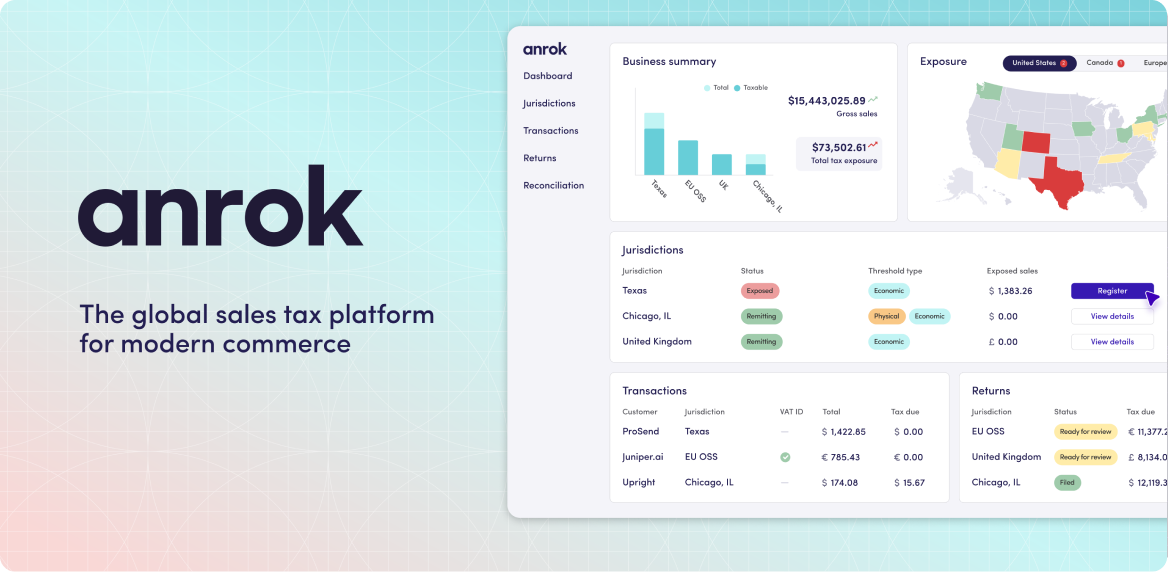
Anrok is a SaaS-focused solution with built-in integrations to limited billing solutions and ERPs.
Pros: Because of its singular focus on SaaS customers, Anrok integrates with many of the most common billing systems that those businesses use. As a newer company Anrok also has the benefit of a pleasing, user-friendly UI.
Cons: Anrok is another US-focused software solution that only offers international support through a network of advisors rather than natively. With no AI component, tax research is done manually with significant margin for error.
Pricing is also a significant detractor with this sales tax software for many businesses, as Anrok charges a platform fee ($499 - $1k) + a percentage of revenue (~0.4%) making it the most expensive solution on the market and a misalignment with the value of the service. (No tax engine does extra work for a $10k transaction vs. a $100k transaction, so why pay for it?)
Anrok is also moving to depersonalized automated support rather than the Slack channel and dedicated representative you get with solutions like Sphere.
Anrok’s solution works best for SaaS businesses who plan to limit their offerings to US customers only without international growth.
Vertex
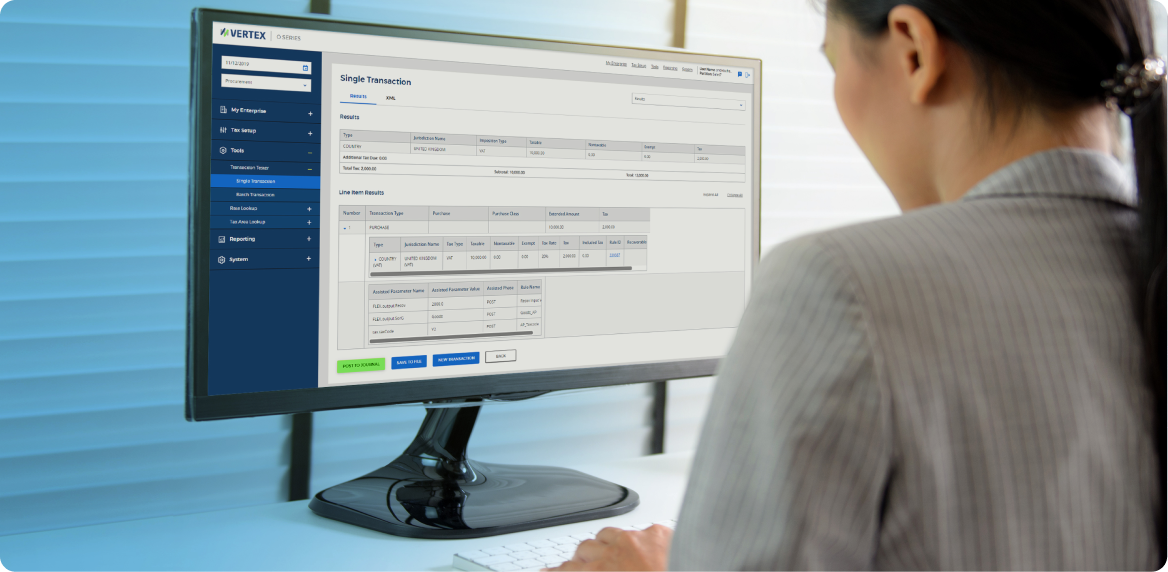
Like Avalara, Vertex is another legacy sales tax solution. Vertex specializes in serving enterprise-grade businesses that contend with complex tax obligations. They boast a bevy of tax experts who can untangle thorny US and international tax problems.
Pros: Their strengths include strong ERP integrations, meaning that they can more easily work with how businesses already do business rather than requiring extensive manual work on the customer side during onboarding.
Cons: However, as an enterprise-focused business that handles lots of unique scenarios, as well as employs a team of tax experts, Vertex is priced accordingly, meaning that it isn’t the right solution for agile small and medium-sized businesses.
Because of Vertex’s limited focus on enterprise-grade businesses, SaaS companies, as well as other growing businesses, would be better served with a more modern and focused tax compliance solution.
TaxCloud
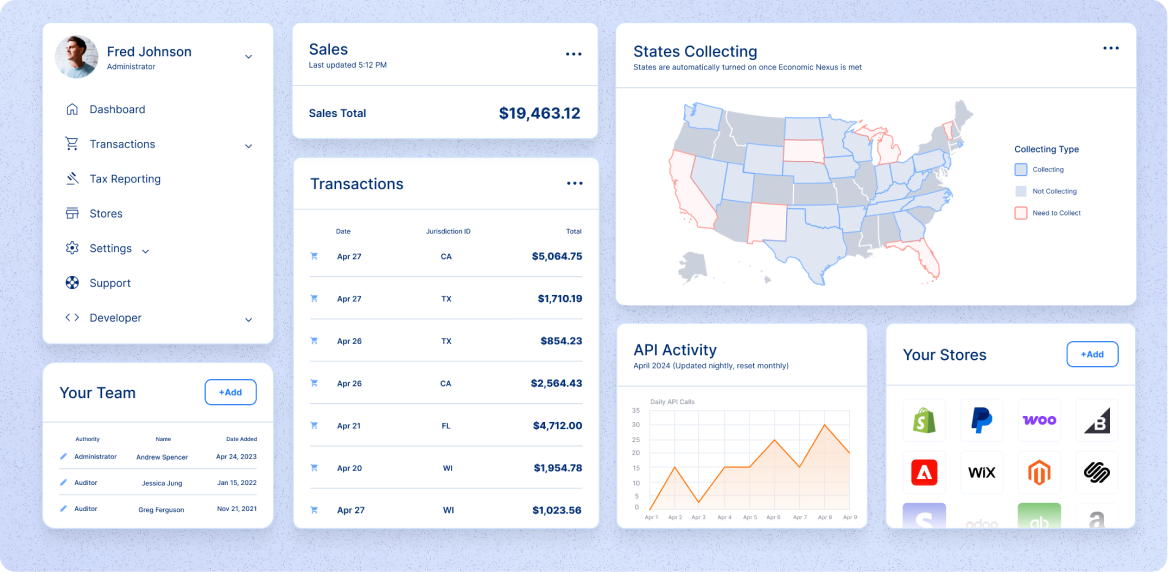
TaxCloud bills itself as the “right-sized” sales tax solution, and it excels at helping very small businesses who have nexus in just their home state.
Pros: With their free tier (which handles one state), TaxCloud is a budget-friendly sales tax compliance solution for US-based small businesses that want to remain contained.
Cons: While their lower tiers are useful, TaxCloud isn’t built to scale with growing businesses, with their $799 annual plan limited to just 2,400 transactions per year. As with most other solutions on this list, they are also US-only, which can be a detriment when selling SaaS products, digital goods and other items that aren’t bound by borders.
Businesses who plan to remain small may find that TaxCloud’s free, one-state tier serves their needs adequately.
Stripe Tax
.png)
Stripe Tax is a sales tax collection solution expressly for Stripe users. It offers sales tax calculation and collection, but only on sales transactions processed through Stripe.
Pros: Stripe Tax is built into Stripe plans. If you only use Stripe for order taking and billing, then this solution may fit your needs.
Cons: While Stripe Tax calculates sales tax, it doesn’t offer any other aspects of sales tax management, such as reporting and filing. Because of this, it offers limited jurisdiction coverage and no support for edge cases, such as handling sales tax in home-rule cities.
Stripe Tax pricing is also based on a % of revenue at 0.5% of each transaction, so prospective customers should run the numbers to ensure they are getting the best value for what amounts to sales tax collection only (i.e. no reporting, filing, or remittance.)
Other US-Focused Startups
A few other contenders have cropped up in recent years in an increasingly saturated US-only sales tax compliance space.
- Numeral (US-only) - This ecommerce focused startup offers simplified flat-fee pricing and throws in virtual mailbox capabilities to help businesses deal with the sometimes-cumbersome communications from states.
- Zamp (US-only) - Zamp calls their offering “white-glove managed service” but combines that with a modern sales tax dashboard. They strive to be a mid-range priced service somewhere between a SaaS-only solution and a managed service like TaxValet (see below), but this can leave customers unclear about who handles what sales tax component.
- CereTax (US-only) - CereTax is another niche solution focusing on some industries with specific tax needs, like manufacturing and deregulated energy. Customers report manual onboarding processes that can take up to three months, though this may be due to the additional taxes and other fees their customers in specialized industries face.
- Kintsugi (US-only) – This new solution is leveraging AI to assist with sales tax calculations, reporting, and filing, but is limited to the US-only.
International VAT Vendors
- Taxually & Marosa – These two similar entrants into the tax compliance market are Europe-focused, with strong emphasis on VAT and GST compliance. While Taxually claims to also support US sales tax, that support is limited and requires purchasing more than one solution. Marosa focuses on VAT only. These solutions are best for Europe-focused businesses with limited US sales tax exposure.
TaxValet and Full-Service Providers
In a departure from the usual fully automated sales tax compliance offerings, full-service providers like TaxValet offer to take on sales tax for you using a combination of automated and manual internal processes.
These solutions serve businesses who want a totally hands off approach and can afford the hefty price tag of $1-3,000 per month. It’s important to note that these services often use the other sales tax automation services listed above and pass that price on to end users. Still, cash flow positive businesses with complex tax compliance needs might consider full-service tax solutions worth the high price.
How To Cancel Avalara
How to cancel Avalara depends on the service used and any contact terms.
In most cases, cancelling requires filling out a “cancellation request form.” The form allows you to choose which Avalara service(s) you are currently using and gives instructions on how to cancel that specific service.
Note that if you are using Avalara through a third-party, then the third-party may apply different terms to your cancellation. Be sure to contact your direct vendor through their customer service.
The Avalara website notes that fees will still be due until the end of the contract term.
Cancellation Considerations
When cancelling or switching sales tax services, it’s vital to both prevent overlaps and ensure continuity of service.
An overlap between Avalara and your new service may result in duplicate sales tax filings (and payments!). But a lapse in service could mean forgetting a filing and payment, or, depending on which service you are using, even failing to collect sales tax from customers at the individual transaction level, leaving you to pay the tax out of pocket.
Pro Tips for Switching away from Avalara
- Evaluate Avalara cancellation fees vs. your new tax solution’s fees – Evaluate how much you are actually remitting to Avalara, counting both monthly/annual fees as well as usage fees, surcharges, and overage fees. In some cases, it’s actually more cost-effective in both money and person-hours to pay the Avalara cancellation fee rather than wait the contract out.
- Line up a new vendor before cancelling – Because Avalara is the legacy solution, most sales tax solutions have ample experience helping their customers offboard. Some, like Sphere, even have AI-enabled onboarding solutions that can make switching from Avalara instantaneous, as opposed to a weeks or months-long endeavor.
- Switch at the end of the month/quarter/year – Because, especially in the US, sales tax remittance dates vary, be sure to switch at the end of a taxable period. If your business owes some taxes quarterly and some monthly, it’s often best to set your switch day to the first day of a taxable quarter such as January, April, July, or October.
- Get guarantees in writing – Sometimes it isn’t possible to transition all of your sales tax operations in a single day. If you plan on continuing to partially use Avalara (i.e. for one state or for one type of tax) until the complete changeover, be sure to get a new agreement in writing to avoid consequences like fines, penalties, and underpayment.
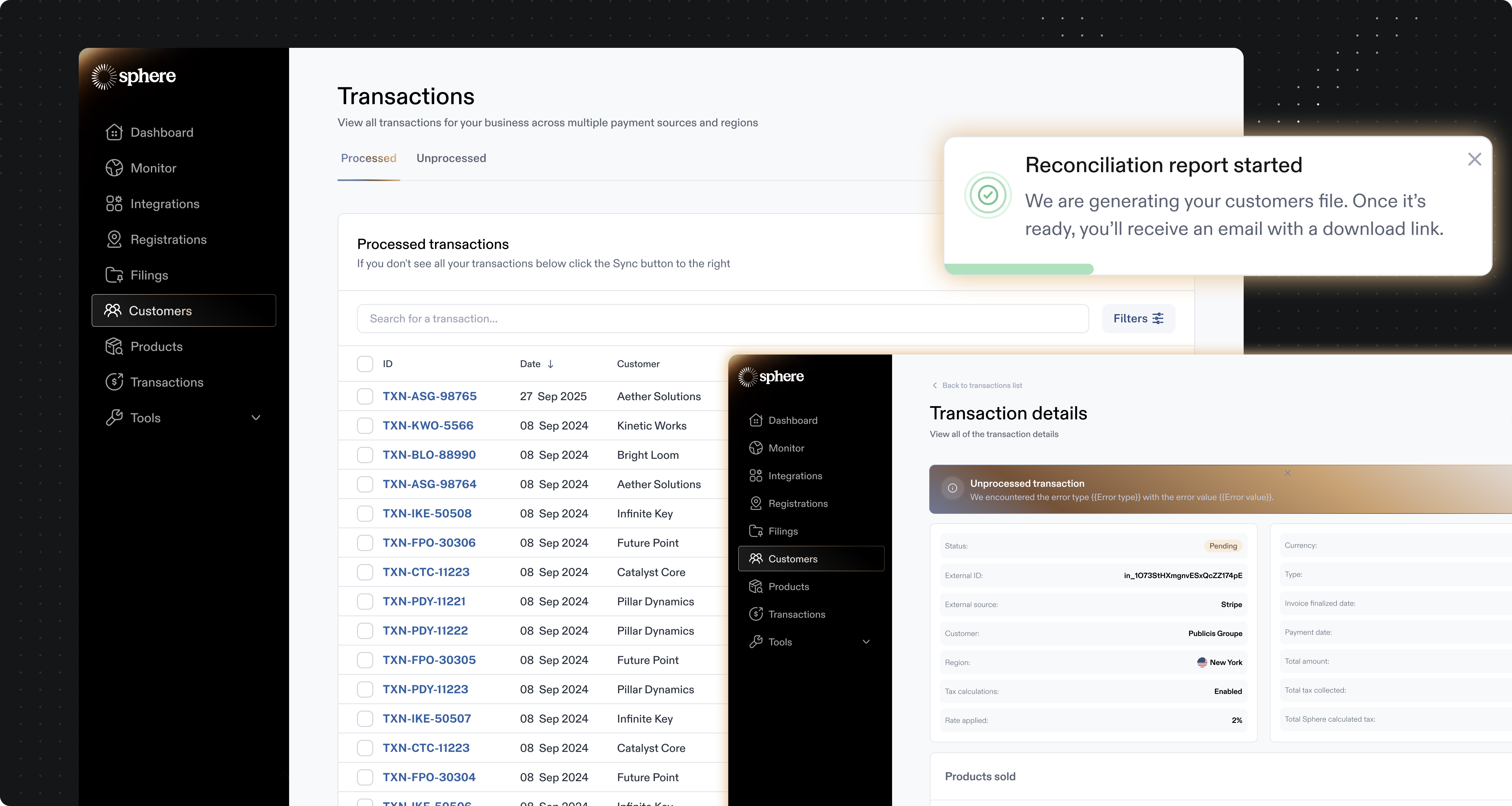
Why Sphere Is the Best Avalara Alternative
After examining the various alternatives to legacy solution Avalara, Sphere stands out from the crowd as the superior choice for modern, growing companies.
- Truly Global Coverage – Unlike legacy solutions, which have cobbled together international tax support (if they offer it at all), Sphere started out as a totally global solution. With Sphere, there are no third-party advisors, and no trying to get separate US & international solutions to talk to each other. It’s the only platform that offers both US and international VAT/GST support in a single native solution.
- AI-Powered Accuracy for Global Companies – Tax compliance requires processing mountains of complex regulation – a perfect use case for AI. As the first AI-forward tax solution, Sphere eliminates the manual work that has plagued the users of legacy tax solutions.
- Simple, Transparent Pricing – Understanding your tax compliance solution’s pricing shouldn’t be more complicated than understanding US sales tax, yet with many solutions like Avalara that’s exactly what you get. With Sphere there are no usage fees, no overages, and no long-term contracts with hidden early cancellation fees. Your business’s budget will thank you.
- Built for Modern Business Stacks – Sphere integrates seamlessly with modern financial systems like Stripe, Shopify, and QuickBooks. Setup takes minutes instead of months, and the platform runs on autopilot once configured—no more manual tax management required.
- Exceptional Customer Support – When you need help, Sphere's dedicated support team responds quickly—a refreshing change from Avalara's notorious 8-24 hour wait times. Our customers consistently highlight our support as "second to none."
- Trusted by Industry Leaders – Modern tax compliance issues call for modern solutions. Forward-thinking companies like ElevenLabs, Replit, and Runway have already made the switch to Sphere
Are you a modern, fast-growing and global company? We invite you to switch and save up to 40% by scheduling a free demo with Sphere.







.png)

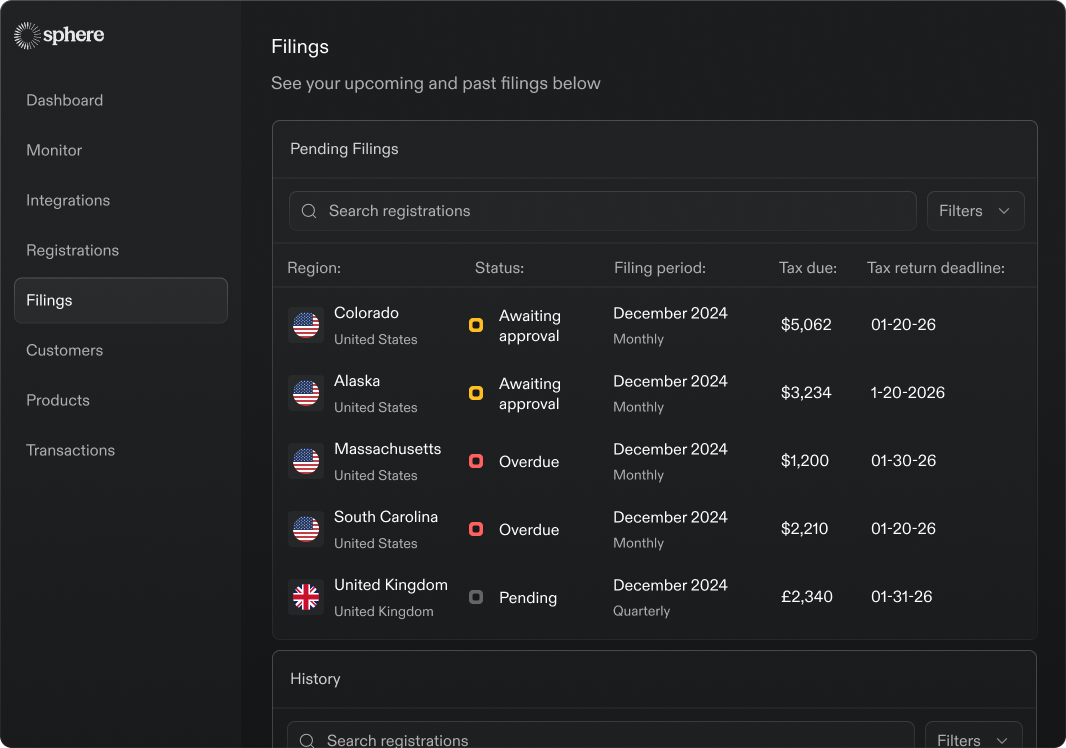


.png)
